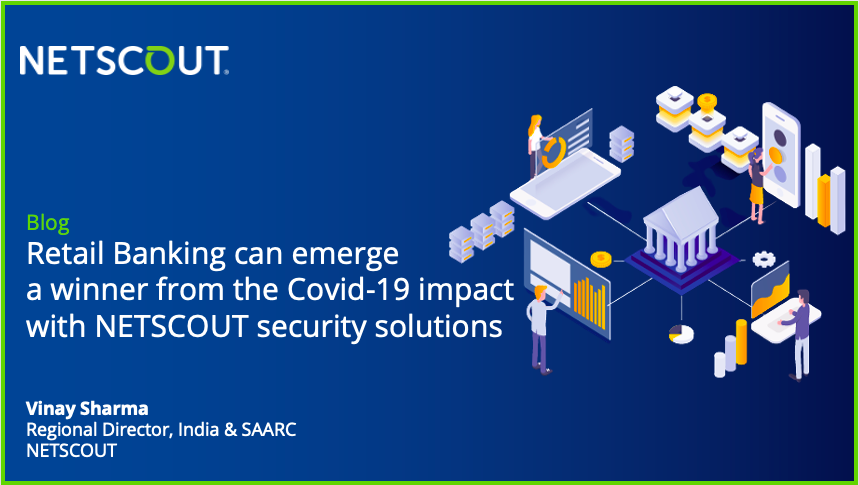Retail Banking can emerge a winner from the Covid-19 impact with NETSCOUT security solutions - Vinay Sharma, Regional Director, India & SAARC, NETSCOUT

The pandemic has already affected banks adversely with the non-repayment of business loans due to poor revenues and individuals having lost their jobs, low value of financial instruments and reduced demand for service offerings. These disruptions in normalcy has unpleasantly welcomed cyber-criminals who were waiting to exploit this opportunity presented to them. Customers are unwittingly falling prey to ‘fake’ communication sent on behalf of banks and other social engineering tactics from cyber-fraudsters. On the other hand, with remote working culture taking precedence and employees’ using BYOD, mobile and low-end home PCs is creating challenges in accessing the bank’s VPN. The security perimeter has to be extended to every remotely working employee and the devices used, wherein the bank’s legacy security systems are incapable of successfully securing all end-points.
A robust strategy to protect banking ecosystem from cyber-threats – NETSCOUT offering
Retail Banking Sector is today in need of dynamic transformation of its services to effectively address global demands and disruptions. The key is to effectively cater to customers’ evolving requirements, enable speedy digital transactions and maintain compliance while being able to protect banks’ networks and applications besides ensuring their availability at all times.
Along with putting a long term cyber-security strategy is in place, the Security team has to plug the holes that were created since the lockdown. Key elements to focus on are, putting in place Cloud Security Controls in development environments, prevent attackers from identifying the VPN concentrators and upgrade to higher Ransomware and DDoS protection capabilities.
NETSCOUT solutions to address and mitigate cyber-threats
nGeniusOne Platform
Organisations have to be monitored to ensure success of every transactions across touch points, such as merchant acquirers, payment processors, issuing banks, card networks and retailers. nGeniusOne Platform provides real-time, end-to-end visibility into the performance of application services by analyzing packet data across hybrid-cloud and help uncover anomalies. This speeds up troubleshooting and reduces the Mean Time to Repair for Citrix solutions used in retail banking environments.
Omnis Cyber Investigator
The Omnis Cyber Investigator provides comprehensive network visibility across hybrid cloud environment and conducts a highly contextual investigation of cyber-attacks and remediates the threat by blocking it at the firewall or with the use of Arbor Edge Defense. This function is vital to ensure proper service assurance and cyber-security.
Arbor Edge Defense
This is an inline security appliance deployed at the network perimeter between the firewall and internet router, using highly scalable stateless packet processing technology. It blocks in bulk, inbound cyber-attacks such as DDoS and outbound malicious communication, thus acting as first and last line of perimeter defense of organisations.
Omnis Security Platform
This solution is an Advanced Threat Analytics and Response platform providing highly scalable network instrumentation for cost effective packet derived, comprehensive network visibility into the organisation’s entire digital infrastructure. It offers the scale, scope and consistency required to secure today’s digital infrastructure.
SpectraSecure
Testing the resilience to DDoS attacks in a controlled manner is done by SpectraSecure which uses built-in configurable DDoS attack vectors. It verifies whether the applications, networks or services can withstand an attack before it occurs.



